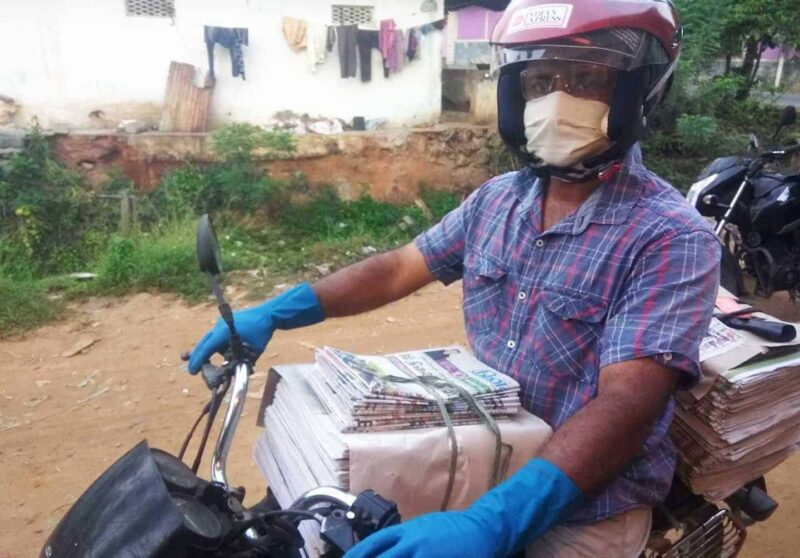Shortly after the Covid-19 pandemic took hold earlier this year, we began hearing from reporters about the toll it was taking on their newsrooms and freelance prospects. In response, Internews’ Earth Journalism Network (EJN) launched opportunities across its programs to provide support that would allow reporters to continue covering the environment, even in the midst of a public health crisis.
Following its latest calls for story proposals, EJN has issued more than two dozen small grants to reporters in the Asia-Pacific and East Africa regions for critical reporting on environmental crime, wildlife issues, climate change and its intersections with current social, economic and health-related problems.
In the Asia-Pacific, we’ve recently awarded 14 grants to journalists in six different countries, many of them focused on indigenous communities and natural resource exploitation. This follows 11 investigative story grants and six grants for the Pacific region earlier in the year, for a total of 31 grants in 2020.
In this latest round, one reporter in the Philippines will look at how Covid-19 is impacting indigenous peoples and environmental activists, and another will produce an audio documentary on the country’s leading botanists. In Nepal, we’re supporting stories about how pandemic-related lockdowns are affecting pastoral communities and giving rise to an increase in illegal trade of wildlife and timber. A reporter in Indonesia will investigate the illegal sand mining industry and its impact on the environment, while the illegal harvesting and export of rare indigenous tree will be the focus in the Solomon Islands.
In India, we’re supporting seven reporters to cover stories ranging from water shortages to land rights for forest dwellers to food systems and the value of environmental biodiversity to how commercial development and extractive industries are threatening fragile ecosystems and the people who rely on them. We’ll also have stories that focus on resilience, such as an indigenous tribe whose traditional ways have proven beneficial during the coronavirus outbreak.
Full list of grantees:
- Bernice Beltran , Philippines
- Bhavita Bhatia, Nepal
- Dheeraj Mishra, India
- Kavitha Iyer, India
- Naresh Green, India
- Ofani Eremae, Solomon Islands
- Patricia Aquino, Philippines
- Sharanya Deepak, India
- Sushmita, India
- Tanmoy Bhaduri, India
- Tufan Neupane, Nepal
- Vasudevan Sridharan, India
- Wang Yan, China
- Parto Sasmito, Indonesia
Our goal with these grants, which are part of our four-year Asia Pacific project, is to support stories that investigate how and why governments, businesses and financial institutions are acting in ways that directly or indirectly exploit our land and natural resources.
The focus is slightly different in East Africa, where we’ve also just awarded 14 grants to reporters pursing deep investigations into wildlife-related issues such as poaching and trafficking of endangered wildlife like turtles and African Grey parrots, illegal timber harvesting and the rise in bushmeat consumption. A few reporters will explore courts processes and ask why most of the masterminds of these crimes never face justice, and one will look at a less common phenomenon in the region: breeding wildlife as pets.
Here, priority was given to proposals that focused on the illegal wildlife trade, which poses a great threat to biodiversity and is suspected of playing a role in the Covid-19 outbreak. The awarding of the grants follows a series of online investigative roundtables, where we discussed tools and tips for reporting on the topics outlined above.
Full list of our East Africa grantees:
- Peter Muiruri, Kenya
- Kajumba Godfrey, Uganda
- Jenifer Gilla, Tanzania
- Sharon Onyango , Kenya
- Protus Onyango, Kenya
- Milliam Murigi, Kenya
- Patrick Mayoyo, Kenya
- Amana Nyembo, Tanzania
- Ann Mikia, Kenya
- Caroline Chebet, Uganda
- Alex Tumuhimbise, Kenya
- Mary Mwendwa, Uganda
- Richard Drasimaku, Uganda
- Kiiza Innocent, Kenya
At the start of next year we’ll be announcing the recipients of the last round of our Bay of Bengal project grants, our Biodiversity Media Initiative story grants and a new project focused on the policy, financing, payment and infrastructure hurdles to renewable energy development in parts of India.
Continue to check our website for more opportunities and exciting updates in 2021.
